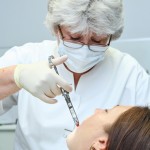
The failure rate for inferior alveolar nerve block (IANB) in patients with irreversible pulpitis is reported to be between 43-83% and related to inflammatory changes in the Pulp. The use of a variety of pharmacological agents (eg NSAIDs and steroids) to improve the success rates have been investigated. Reviews of individual agents have been published but head-to-head comparisons to assess the relative efficacy are lacking.
The aim of this review was to assess which is the most effective oral premedication in increasing the anaesthetic success of Inferior Alveolar Nerve Block in patients with irreversible pulpitis?
Methods
Searches were conducted in the Medline, Ebscohost, Cochrane Central Register of Control Trials (CENTRAL) and ClinicalTrials.gov databases with no language restrictions. Randomised controlled trials (RCTs) of the effectiveness of any oral premedication alone or in combination on the success of IANB in adult patients undergoing root canal treatment on teeth with irreversible pulpitis were considered.
Two reviewers independently selected studies, abstracted data and assessed study quality. The Cochrane risk of bias tool was used for individual studies with GRADE being used to assess overall quality. Standard pairwise meta-analysis using a random- effects model and Network meta-analysis were conducted.
Results
- 19 RCTs involving a total of 1654 patients were included.
- 12 studies were considered to be at low risk of bias,2 at unclear risk and 5 at high risk.
- A range of premeditations were used, NSAIDs (ibuprofen, ketorolac, indomethacin, diclofenac, lornoxicam, piroxicam and naproxen sodium), steroids (dexamethasone), acetaminophen, opioids (hydrocodone) and benzodiazepines (alprazolam).
- NMA demonstrated that compared to placebo, dexamethasone was most effective in increasing anaesthetic success (RR, 2.92 [95% CI 1.74,4.91]; SUCRA = 0.96), followed by NSAIDs (RR, 1.92 [95% CI 1.63,2.27], SUCRA = 0.738) and Tramadol (RR, 2.03 [95% CI 1.18,3.49], SUCRA = 0.737).
- Premedication with acetaminophen added to NSAIDs demonstrated similar efficacy as NSAIDs alone (RR, 1.06 [95% CI 0.79,1.43]).
- Sensitivity analyses proved the superiority of dexamethasone or NSAIDs over any other premedications.
Conclusions
The authors concluded: –
The available evidence from this network meta-analysis demonstrated that oral premedication with dexamethasone, NSAIDs and Tramadol increases the success rate of IANB in teeth with irreversible pulpitis. Future high-quality randomized controlled trials are required to confirm the results of this network meta-analysis on the use of dexamethasone or Tramadol in treating patients with symptomatic irreversible pulpitis.
Comments
The reviewers have employed a good search strategy examining the three databases with no language restrictions in their efforts to identify randomised controlled trials on this question. As the authors note previous reviews have been conducted on this topic ( Dental Elf 25th Jan 2017) enter suggested benefits from the use of pre-operative medication on IANB effectiveness. This well conducted network meta-analysis provide some helpful information on the relative efficacy of the different features and highlights areas where further high-quality evidence is required.
Links
Primary Paper
Pulikkotil SJ, Nagendrababu V, Veettil SK, Jinatongthai P, Setzer FC. Effect of oral premedication on the anaesthetic efficacy of inferior alveolar nerve block in patients with irreversible pulpitis – A systematic review and network meta-analysis of randomized controlled trials. Int Endod J. 2018 Feb 26. doi:10.1111/iej.12912. [Epub ahead of print] Review. PubMed PMID: 29480930.
Other references
Original review protocol on PROSPERO
Dental Elf 25th Jan 2017
Pre-operative analgesia for patients with pulpitis improved anaesthetic success

[…] post Inferior Alveolar Nerve Block: improving anaesthetic success in patients with irreversible pulpitis appeared first on National Elf […]